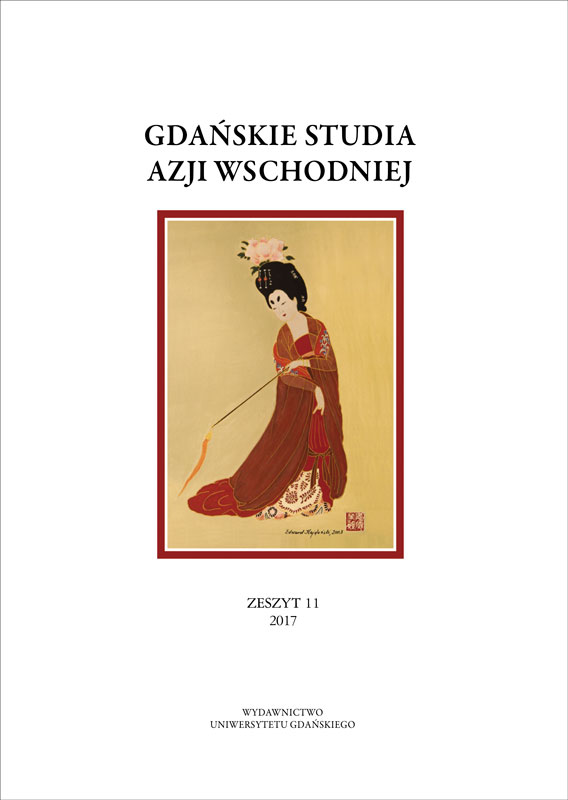Rozwój gospodarki chińskiej w okresie realnego socjalizmu – analiza podstawowych wskaźników makroekonomicznych
Abstrakt
China, after years of an international isolation, begins to play a more extensive role in the world. It becomes the main world player in every branch of a single nation’s activity, starting from economy through military to social and culture areas. One of the probes of the international rebirth of this great nation is its diplomatic relations with Vatican. The reason diplomatic relations with the state of Vatican were for some time out of discussion was the Chinese ideology. After it was abandoned, it appeared there are only two issues implicating those relations: Vatican’s diplomatic relations with Taiwan and the Chinese Catholic Church’s wish to remain independent from the Pope.
The last few years show the meaningful change of the Chinese and Vatican’s approach to the problem: it appears that the, so called, border issues are defined. Vatican expects China to acknowledge the Pope as the head of the universal Church, whereas Vatican is supposed to revise its diplomatic relations with Taiwan – Vatican is now the only state in Europe to maintain the diplomatic links with Taiwan. In the research, the author has traced back the tangled relationship between the Holy See and the Middle Kingdom starting with the first footprints of Christianity in China to the current situation, when the significant thaw in bilateral relations takes place. Concluding, the article shows the signs of the real re-establishing of diplomatic relations between those two very specific states.
Downloads
Bibliografia
E. Cieślik, Rozwój gospodarczy Chin od roku 1978 do kryzysu globalnego, Warszawa 2015.
T.J. Huges, China’s Economy – Retrospect and Prospect, „International Affairs” 1970, no. 1
O. Weggel, Chiny, Warszawa 2006.
E. Cieślik, Historia gospodarcza Chin okresu przedkomunistycznego. Przekształcenia wewnętrzne i międzynarodowe stosunki gospodarcze,„Gdańskie Studia Azji Wschodniej” 2016, z. 10.
J.K. Fairbank, Historia Chin. Nowe spojrzenie, Gdańsk 1996.
R. Sławiński, Historia Chin i Tajwanu, Warszawa 2002.
Economy,China Handbook Editorial Committee, Beijing 1984.
J. Polit, Historia Chin, Warszawa 2004.
L. Fuchun, Report of the First Five-Year Plan,1953–1957 [w:] Communist China, eds. R.R Bowie, J.K. Fairbank, Cambridge 1962.
K.E. Brodsgaard, Paradigmatic Change: Readjustment and Reform in the Chinese Economy,1953–1981, Part I, „Modern China” 1983, no. 1.
China’s Third Five-Year Plan, „The China Quarterly” 1966, no. 25, s. 171.
W.J. Dziak, Chiny wschodzące supermocarstwo, Warszawa 1996.
R.F. Denberg, The People’s Republic of China At 50: The Economy, „The China Quarterly” 1999, no. 159.
K. Gawlikowski, Wielki skok 1957–1960, maszynopis powielony 1976.
R. Guo, How the Chinese Economy Works, New York 2007.
Chairman Mao Talks to the People,ed. S. Schram, New York 1974, za: S.W. Mosher, Hegemon. Droga Chin do dominacji, Warszawa 2007.
China under Mao: Politics Takes Command. A Selection of Articles from the „China Quarterly”, London 1966.
A. Spitz, Maoism and the People’s Courts, „Asian Survey” 1969, no. 4.
T. Shanbad, China’s „Great Leap Forward”, „Far Eastern Survey” 1959, no. 7.
J. Rowiński, Polityka Chińskiej Republiki Ludowej wobec Indii w latach 1959–1963 (rozprawa doktorska).
K. Chao, Economic Aftermath of the Great Leap in Communist China, „Asian Survey” 1964.
W. Rodziński, Historia Chin, Wrocław–Warszawa–Kraków 1974.
D. Bell, The Cultural Contradictions of Capitalism (Kulturalna sprzeczność kapitalizmu), Archiwum Przekładów i Opracowań, Warszawa 1978.
A. Maddison, Chinese Economic Performance in the Long Run, Paris 1998.
K. Seitz, Chiny. Powrót olbrzyma,przeł. T. Mazur, Warszawa 2013.
D.H. Perkins, Reforming China’s Economic System,“Journal of Economic Literature” 1988, no. 2.
C. Bramall, Chinese Economic Development, London–New York 2009.
China. Strategies for Reducing Poverty in the 1990s,Washington D.C. 1992, s. 1.
R. Kanbur, X. Zhang, Fifty Years of Regional Inequality in China: A Journey Through Central Planning, Reform, and Openess, „Review of Development Economics” 2005, no. 9.
D.T. Yang, C. Fang, The Political Economy of China’s Rural-Urban Divide, Center for Research on Economic Development and Policy Reform, Stanford University, “Working Paper” 2000, no. 52.
B. Ashtone, K. Hiu, A. Piazza, R. Zeitz, Famine in China,1958–61,„Population and Development Review” 1984.
D.N. Sull, Y. Wang, Made in China, Warszawa 2006.
W.W. Rostow, The Stages of Economic Growth: A Non-communist Manifesto, Cambridge 1960.
W.W. Rostow, The Stages of Economic Growth, „The Economic History Review” 1959, no. 1 (12).
J.K. Kallgren, China 1978: The New Long March, „Asian Survey” 1979, no. 1.

 Uniwersyteckie Czasopisma Naukowe
Uniwersyteckie Czasopisma Naukowe





